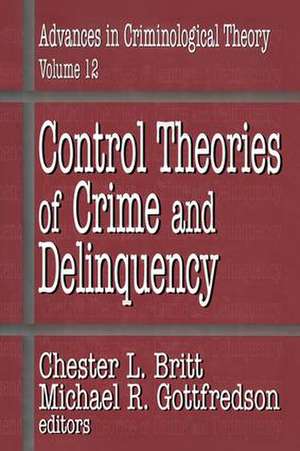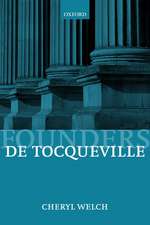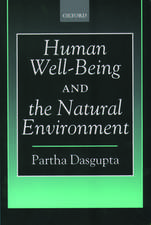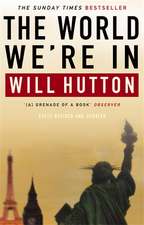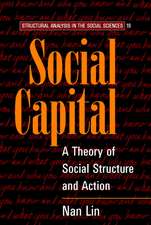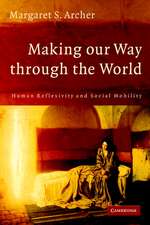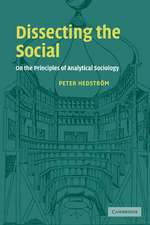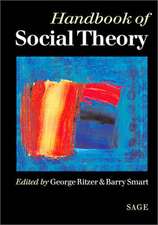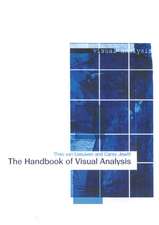Control Theories of Crime and Delinquency: Advances in Criminological Theory
Editat de Chester L. Britt, Michael R. Gottfredsonen Limba Engleză Paperback – 29 ian 2018
The contributions to this volume explicate and extend the application of control theory. It is divided into three general areas. Part 1 focuses on key assumptions and components of control theories. Contributors discuss the notion of learning, or socialization, in the context of control theory and the effects that families, peers, and the criminal justice system have on self-control, social ties, and criminal behavior.
Part 2 applies control theory to areas typically assumed to be out of the domain of self-control theory and social control theory, such as gender differences in crime, domestic violence, and group crime. Considering control theory's emphasis on explaining individual criminal acts, these chapters suggest an interesting area of development by highlighting the possibility that differences in crime across or within groups may begin with individual characteristics and then making inferences about groups and group processes.
Part 3 approaches the explanation of crime cross-nationally and at the macro-level. Although the authors take different approaches, they all illustrate that a theory of crime does not require culture-specific elements in order to be a valid cross-cultural explanation. Contributors to this volume include: Robert Agnew, Todd Armstrong, Leana Allen Bouffard, Augustine Brannigan, Chester Britt, Barbara Costello, Maja Dekovic, Matt DeLisi, Michael Gottfredson, Henriette Haas, Kelly H. Hardwick, Travis Hirschi, Marianne Junger, Martin Killias, Helen Mederer, Kevin Thompson, and Alexander Vazsonyi.
| Toate formatele și edițiile | Preț | Express |
|---|---|---|
| Paperback (1) | 349.15 lei 6-8 săpt. | |
| Taylor & Francis – 29 ian 2018 | 349.15 lei 6-8 săpt. | |
| Hardback (1) | 1004.55 lei 6-8 săpt. | |
| Taylor & Francis – 30 noi 2003 | 1004.55 lei 6-8 săpt. |
Din seria Advances in Criminological Theory
-
 Preț: 327.48 lei
Preț: 327.48 lei -
 Preț: 337.21 lei
Preț: 337.21 lei -
 Preț: 432.29 lei
Preț: 432.29 lei -
 Preț: 389.38 lei
Preț: 389.38 lei -
 Preț: 416.82 lei
Preț: 416.82 lei -
 Preț: 395.04 lei
Preț: 395.04 lei -
 Preț: 489.26 lei
Preț: 489.26 lei - 14%
 Preț: 299.52 lei
Preț: 299.52 lei - 13%
 Preț: 297.57 lei
Preț: 297.57 lei -
 Preț: 375.54 lei
Preț: 375.54 lei -
 Preț: 391.22 lei
Preț: 391.22 lei - 13%
 Preț: 351.24 lei
Preț: 351.24 lei -
 Preț: 416.22 lei
Preț: 416.22 lei -
 Preț: 449.63 lei
Preț: 449.63 lei -
 Preț: 393.52 lei
Preț: 393.52 lei -
 Preț: 444.80 lei
Preț: 444.80 lei - 18%
 Preț: 999.51 lei
Preț: 999.51 lei - 16%
 Preț: 260.54 lei
Preț: 260.54 lei - 16%
 Preț: 262.73 lei
Preț: 262.73 lei -
 Preț: 342.70 lei
Preț: 342.70 lei - 14%
 Preț: 299.52 lei
Preț: 299.52 lei -
 Preț: 441.91 lei
Preț: 441.91 lei -
 Preț: 395.37 lei
Preț: 395.37 lei -
 Preț: 426.46 lei
Preț: 426.46 lei -
 Preț: 353.61 lei
Preț: 353.61 lei -
 Preț: 389.66 lei
Preț: 389.66 lei - 30%
 Preț: 769.59 lei
Preț: 769.59 lei
Preț: 349.15 lei
Nou
Puncte Express: 524
Preț estimativ în valută:
66.81€ • 69.94$ • 55.28£
66.81€ • 69.94$ • 55.28£
Carte tipărită la comandă
Livrare economică 05-19 aprilie
Preluare comenzi: 021 569.72.76
Specificații
ISBN-13: 9781138508590
ISBN-10: 1138508594
Pagini: 290
Dimensiuni: 152 x 229 x 28 mm
Greutate: 0.45 kg
Ediția:1
Editura: Taylor & Francis
Colecția Routledge
Seria Advances in Criminological Theory
Locul publicării:Oxford, United Kingdom
ISBN-10: 1138508594
Pagini: 290
Dimensiuni: 152 x 229 x 28 mm
Greutate: 0.45 kg
Ediția:1
Editura: Taylor & Francis
Colecția Routledge
Seria Advances in Criminological Theory
Locul publicării:Oxford, United Kingdom
Notă biografică
Chester L. Britt, Michael R. Gottfredson
Cuprins
1: Self-Control and Opportunity; 2: Self-Control Pathology: The Elephant in the Living Room; 3: The Effect of Learning on Crime: Contrasting A General Theory of Crime and Social Learning Theory; 4: The Interactive Effects of Social Control Variables on Delinquency; 5: A Control Theory of Gender Difference in Crime and Delinquency *; 6: Genocide and General Theory; 7: Sexual Harassment and Low Self-Control: A Proposed Application of the General Theory of Crime; 8: Punishment of Children from the Perspective of Control Theory; 9: Self-Control, Group Solidarity, and Crime: An Integrated Control Theory; 10: Comparative Criminology: Content or Simply Methodology?; 11: Crime as Risk-Taking: Co-occurrence of Delinquent Behavior, Health-Endangering Behaviors, and Problem Behaviors; 12: The Versatility vs. Specialization Debate: Different Theories of Crime in the Light of a Swiss Birth Cohort 1; Contributors
Descriere
Amajor shift in critical attitudes toward the arts took place in the eighteenth century. The fine arts were now looked upon as a group, divorced from the sciences and governed by their own rules. The century abounded with treatises that sought to establish the overriding principles that differentiate art from other walks of life as well as the principles that differentiate them from each other. This burst of scholarly activity resulted in the incorporation of aesthetics among the classic branches of philosophy, heralding the cognitive turn in epistemology. Among the writings that initiated this turn, none were more important than the British contribution. The Arts in Mind brings together an annotated selection of these key texts.A companion volume to the editors' Tuning the Mind, which analyzed this major shift in world view and its historical context, The Arts in Mind is the first representative sampling of what constitutes an important school of British thought. The texts are neither obscure nor forgotten, although most histories of eighteenth-century thought treat them in a partial or incomplete way. Here they are made available complete or through representative extracts together with an editor's introduction to each selection providing essential biographical and intellectual background. The treatises included are representative of the changed climate of opinion which entailed new issues such as those of perception, symbolic function, and the role of history and culture in shaping the world.>
